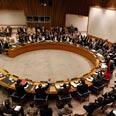
A stronger UN needed
Op-ed: For a body tasked with maintaining world peace, Security Council has dismal record
As the world becomes more of a “global village,” the application of international jurisdiction becomes all the more relevant. The ability to broadcast tribulations and the fate of a nation to a curious world filled with people glued to their smartphones brings about a burden of responsibility – as the mere awareness of pain and suffering should bring about intervention.
Inaction in the face of injustice is being an accomplice to the crime. World powers have a legal and moral responsibility to protect the innocent. They should uphold the principles they were created to enforce, especially when needed most. However, the application of international jurisdiction is arbitrary, inconsistent and tainted with political influence.
Justice has been evaded too many times to consider universal jurisdiction a success. Although great strides have been made in areas of commerce, trade, and even human rights, the initial and central objective of “maintaining world peace” has been ignored, overlooked, or even point-blank vetoed often enough to cause a lack of trust and a reputation of the UN Security Council as being sadly unjust. The seeds of international law which set out to achieve peace by a military intervention have been sewn but clearly have yet to be fully harvested.
For an organization tasked with maintaining world peace, the UN Security Council has a dismal track record. From failing to prevent the genocide in Rwanda that led to the murder of nearly a million members of the Tutsi tribe, to failing to approve military intervention in Bosnia and what was former Yugoslavia, thereby leading to the death of more than 100,000 people, one wonders where the UN was when it was needed most.
Toothless resolutions
While serving on the Lebanese border a few months ago, I had a rare encounter with a United Nations “peacekeeper” named Brian, from Ireland. During our rather friendly conversation, we spoke of our backgrounds and our different but important roles; then geopolitics in general and finally Hezbollah in particular. Having been a student of international law and recipient of IDF intelligence reports, I asked an unexpected question that bothered Brian to his core.
I asked: What about Resolution 1701? You know… when Israel withdrew from southern Lebanon in 2006, United Nations Interim Forces in Lebanon (UNIFIL) were placed there, promising to “prevent the entry in Lebanon… of arms or related materials.”
“Peacekeeper” Brian was dumbstruck. With both of us aware of Hezbollah’s military arsenal and brutal guerrilla warfare tactics, Brian poignantly admitted UNIFIL tries, but cannot contain the trouble alone. We eventually bid our farewells and I left, disappointed at the inadequacies of those whose job it is to protect, but also with a sense of pride that I belonged to an army where we take pride in defending ourselves, by ourselves.
Almost always, it seems, failure is far easier to gauge than success. The arbitrariness of the international communities’ decisions, however, makes one wonder: Why intervention in Libya was so forthcoming, while parallel bloodshed in other countries, like Syria, has been practically ignored?
Although a resolution against the violence in Syria was eventually passed at the lower-level, non-binding General Assembly, it lacks the power of enforcement and miserably fails to intervene when help is so desperately due. The General Assembly resolution reflects an important world opinion but for all practical purposes, it could be added to the long list of toothless resolutions.
The United Nations may have been founded on noble principles and by righteous people, but as violence continues to rage around the world, a strong, transparent and unbiased UN must emerge, committed to its founding cause: Promoting human rights and pursuing world peace.
World leaders are urged, now more than ever, to end the violence in Syria and prevent any more unnecessary loss of life by bringing down the murderous and dictatorial Assad regime.
The writer is the Jerusalem Coordinator for Yisrael Beiteinu’s English speakers










